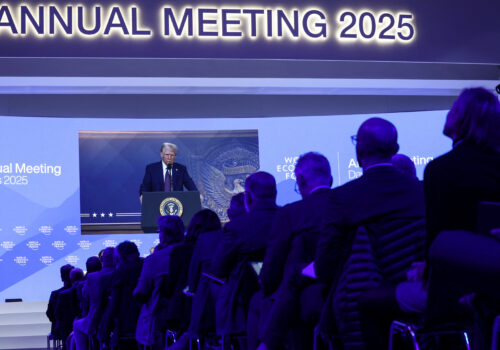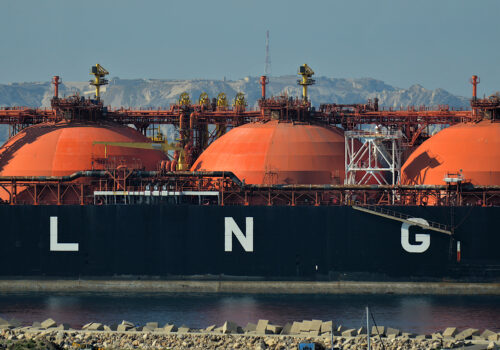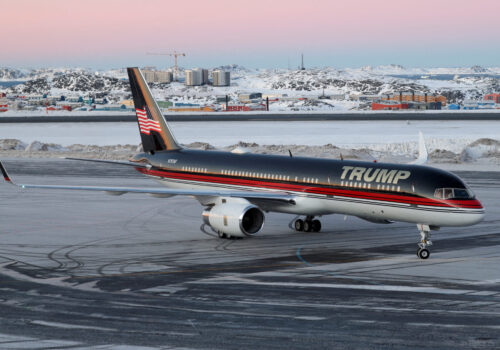Dispatch from Davos: Trump is both symptom and driver of our new geopolitical era
DAVOS—It’s well known that US President Donald Trump is the man of the moment. Less understood is that he’s both the product and the purveyor or our emerging era. It is one characterized by more government intervention, less common cause, more mercantilism, less free trade, and more big-power swagger.
That is my takeaway from the first week of Trump’s second presidency and my thirtieth visit to Davos, Switzerland, for the World Economic Forum’s annual meeting. It remains the most consequential gathering of global political, business, and civil society elites, this year boasting more than three thousand participants from 130 countries.
In my three decades of attending the forum, never has a single individual dominated discussions like Trump did this past week.
That was true even before Trump arrived with a splash last Thursday, though only virtually, delivering his speech to a standing-room-only audience from a colossal screen. More than any of some fifty heads of state and government who spoke this week, he held the attention of his mostly skeptical audience with his self-congratulation, comic timing, derision of former US President Joe Biden, and audacious appeals to global elites for deals and deference.
Trump pronounced his comeback win “the most consequential election victory in 129 years,” ushering in “the golden age of America” that would be characterized by “a revolution of common sense.”
He goaded Saudi Arabian Crown Prince Mohammed Bin Salman, “who is a fantastic guy,” to lower oil prices (which also would help end Russia’s war in Ukraine) and boost Riyadh’s offer of $600 billion of new US investment to one trillion dollars. “I think they’ll do that because we’ve been very good to them,” he said.
Trump chided Russian President Vladimir Putin for his war in Ukraine, which he repeated would never have happened under his presidency. It is a “killing field” that has to stop, he said, making clear that it was Putin, and not the Ukrainians, blocking the path to peace talks.
Trump told Chinese President Xi Jinping that he liked him, but Xi would have to stop his unfair trade practices and help to end Putin’s murderous war. “They have a great deal of power over that situation, and we’ll work with them,” Trump said.
He told all the CEOs in the room to make their products in the United States and enjoy some of the world’s lowest taxes—or choose not to, and that would result in tariffs against them. “Under the Trump administration, there will be no better place on Earth to create jobs, build factories, or grow a company than right here in the good old USA.”
Nir Bar Dea, CEO of Bridgewater Associates, the world’s largest hedge fund, told me that we shouldn’t be surprised by the world’s Trump fixation. It goes far beyond Trump’s determination to trigger change to the unique circumstances that give him leverage.
That leverage includes narrow control of both houses of Congress and a conservative majority on the Supreme Court. It also includes the United States’ current economic dominance, with more than 25 percent of global gross domestic product and with US equities accounting for approximately 76 percent of the MSCI World Index, a benchmark for global stock market capitalization. Add to this existing leverage an emerging era of government intervention, which was hastened by the COVID-19 pandemic but has continued to unfold since then.
“At this time of modern mercantilism comes the rise of Trump,” said Bar Dea of the activist president determined to make a historic mark. “The rise of China, the unequal distribution of globalization gains and the political shifts that followed, the supply chain vulnerabilities realized since COVID, and the wars in Europe and the Middle East—all of this resulted in a total reversal of global dynamics. What people in Davos understand is that, today, what’s in this one person’s mind will be massively important.”
Bar Dea said Trump’s election coincides with “a 180-degree turn” from a post–Cold War era of expanding globalization, free trade, relative global stability, and the retreat of government influence and intervention.
That period has been replaced by global fragmentation, protectionist trends, greater instability (including wars in Europe and the Middle East), and a rising tide of government involvement in picking winners and losers.
That was already the case with the Biden administration’s embrace of national industrial policy through such measures as the Inflation Reduction Act and the CHIPS Act. Trump will build on that interventionist trajectory with “America first” determination.
The mood on the mountain
All that provided the context for the week in Davos, where the response of participants to the early days of Trump 2.0 ranged from celebration to dread, with a wide range of emotions in between.
The celebrants included a good number of CEOs (American and otherwise), and a smattering of government officials, who regard the tax-cutting, job-creating, energy-loving, artificial intelligence-supporting, cryptocurrency-embracing, peace deal-seeking, anti-woke commander-in-chief as just the tonic for our times.
At the same time, the dread is widespread, emerging from concerns about Trump’s “above the law” practices, represented by his pardons of some 1,500 people charged with crimes for the January 6, 2021, attack on the US Capitol. It also stems from Trump’s economic policies that lean so heavily toward punitive tariffs, and from his threats to the sovereignty of Panama (over its canal) and Denmark (over Greenland) that many here fear will only encourage autocrats like Putin who harbor territorial ambitions.
First, listen to the celebrants, who range from cryptocurrency purveyors to European business leaders yearning for more growth and less regulation to Argentine President Javier Milei, who had been the warm-up act for Trump earlier on Thursday with his anti-woke homily.
Also on Thursday, Trump signed an executive order to promote cryptocurrencies in the United States and work toward a digital asset stockpile. That followed the Security and Exchange Commission’s announcement Tuesday that it would create a task force to advance a digital asset policy overhaul, including both cryptocurrencies and stablecoins, which are pegged to the dollar.
“We see great things happening,” said Denelle Dixon, CEO and executive director of the Stellar Development Foundation. Her organization oversees a network based on blockchain technology whose purpose is to expand cross-border payments and the tokenization of real-world assets by supporting developers and communities building on the Stellar blockchain. “You’re going to see a lot more usage,” she said.
At the same time, she hopes that the industry stays focused on “utility and growth” rather than on flooding the market with new products that are more speculative in nature—like the new $MELANIA and $TRUMP coins, which she said have a place in the ecosystem but are more like “trading cards,” as they don’t really showcase the utility of the technology.
Another industry executive was less generous, telling me that Trump was encouraging “legalized grifting” through his self-interested crypto embrace. “We’ve gone too far too quickly,” he said, “from an administration that was far too unfriendly to business to one that may be too excessive in its friendliness.”
On the energy front, Josu Jon Imaz, the CEO of the Spanish energy company Repsol, said the Trump administration may bring advantages to the energy sector and deliver a wake-up call to Europe.
Imaz said Trump could even bring unanticipated climate benefits, particularly for the Global South, with the potential shifts from coal to less emissions-intensive liquefied natural gas as the United States increases production and lifts Biden administration export controls.
Regarding the European Union, Imaz said of Trump, “He’s pushing us to look at ourselves in the mirror” and recognize that it is high time to address Europe’s slow growth, excessive regulation, and high energy prices.
“Europe reacts well when we are in real trouble,” Imaz said, pointing to the shift away from Russian energy after Putin’s full-scale invasion of Ukraine in 2022 or the response to the pandemic. “We must react. At the same time, a weak and divided Europe is also risky for Washington and a temptation for China.”
The question of sovereignty
Those concerned about Trump’s course were less vocal publicly during the past week in Davos than they were at the beginning of his first term. However, their concerns went to the heart of what the United States has represented to them since World War II—a benevolent proponent for the common good rather than a power acting only for its own interests.
“I belong to the rather worried crowd,” former Swedish Prime Minister Carl Bildt told me, calling Trump’s early international moves “dangerous and destabilizing.”
Bildt sees Trump’s early threats regarding Greenland and the Panama Canal as legitimizing the sorts of threats to national sovereignty that have been involved in Putin’s invasion of Ukraine.
“Does he know the consequences of what he says?” Bildt asked me. “This is dangerous stuff. It really undermines the rules-based world order. The sanctity of borders isn’t a rule. It’s the rule.”
Bildt mentioned reports that a portrait of General Mark Milley, the former chairman of the joint chiefs of staff who locked horns with Trump, was removed from a Pentagon wall, and he regarded it as something unprecedented in the United States and more reminiscent of Joseph Stalin’s Soviet Union.
Another senior European official spoke to me with deep concern about Trump’s phone call this week with Danish Prime Minister Mette Frederiksen over his desire to acquire the autonomous Danish territory of Greenland.
Having been briefed on the call, the official told me that Frederiksen at first tried to engage Trump in a conversation about greater access to Greenland’s rich resources and strategic position, but that Trump was adamant that he wanted full control. It was, the official said, “a forty-seven-minute call with plenty of expletives,” adding, “the Danes are now in crisis mode.”
What this European official really wanted, along with so many others I met with in Davos, was advice about how his country could best manage the United States’ new reality. The most frequent answer in Davos paraphrases the Silicon Valley entrepreneur Peter Thiel, co-founder of PayPal, who told media at the National Press Club ahead of Trump’s first election that American voters took him seriously but not literally.
Eight years later, with Trump far more prominent on the global stage than ever before, Davos participants know he must be taken more seriously than ever before, and perhaps even more literally, as both a symptom and an architect of our changing times.
Frederick Kempe is president and chief executive officer of the Atlantic Council. You can follow him on X: @FredKempe.
This edition is part of Frederick Kempe’s Inflection Points newsletter, a column of dispatches from a world in transition. To receive this newsletter throughout the week, sign up here.
Note: Nir Bar Dea, Carl Bildt, and Josu Jon Imaz are members of the Atlantic Council’s International Advisory Board, and Stellar Development Foundation is a partner of the Council’s GeoEconomics Center.
Further reading
Fri, Jan 24, 2025
Dispatch from Davos: The divide is shrinking between Davos and DC
New Atlanticist By Josh Lipsky, Ananya Kumar
At the World Economic Forum this year, business and government leaders alike signaled that they want to work with the United States and the new US president. They have good reason: there is no alternative.
Thu, Jan 23, 2025
Trump’s clear path to securing US oil and gas dominance
New Atlanticist By Richard L. Morningstar, Landon Derentz
The United States should seize on this moment to ensure long-term US LNG exports to Europe permanently replace Russian natural gas flows.
Wed, Jan 8, 2025
Everything you need to know about Trump’s Greenland gambit
New Atlanticist By
The incoming US president is adamant in his desire to acquire Greenland for the United States, which has angered Denmark and other US allies.
Image: US President Donald Trump makes a special address remotely as Ana Patricia Botin, chairwoman of the Spanish bank Santander, Brian Moynihan, CEO of Bank of America, Patrick Pouyanne, CEO of TotalEnergies, Stephen Schwarzman, CEO and Co-Founder of Blackstone Group and Borge Brende, President and CEO of World Economic Forum attend the 55th annual World Economic Forum (WEF) meeting in Davos, Switzerland, January 23, 2025. REUTERS/Yves Herman


